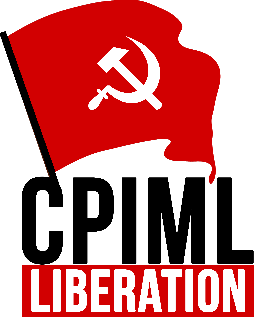
The Communist Party of Bangladesh is a Marxist–Leninist communist party in Bangladesh.

The Communist Party of India (Marxist–Leninist) (CPI (ML)) was an Indian communist party formed by the All India Coordination Committee of Communist Revolutionaries (AICCCR) at a congress in Calcutta in 1969. The foundation of the party was declared by Kanu Sanyal at a mass meeting in Calcutta on 22 April, Vladimir Lenin's birthday. Later the CPI(ML) party splintered into several Naxalite groups.

The Communist Party of India (Marxist–Leninist) Liberation (abbreviated: CPI(ML), CPI-ML, CPIML(L), CPI-ML(L), CPI MaLe, or CPIML Liberation) also referred to as the Liberation Group, is a Communist political party in India.

Marxist Communist Party of India, MCPI was a political party in India that formed in 1983 under the leadership of Mohan Punamia. It emerged as a splinter group of Communist Party of India (Marxist) stuck to the original 1964 programme. The party general secretary was Jagjit Singh Lyallpuri.
Lal Nishan Party (Leninvadi) (Red Flag Party (Leninist)) is a communist political party in the Indian state of Maharashtra. LNP(L) was formed a splinter group of Lal Nishan Party in 1988. LNP(L) was critical to that LNP had gotten closer to the Indian National Congress and the Perestroika.

The Communist Party of Spain (Marxist-Leninist) is a communist political party in Spain, formed in 1964 through the merger of splinter groups of the Communist Party of Spain (PCE).

The Communist Party of Nepal (Marxist–Leninist–Maoist), abbreviated CPN (MLM), was a minor communist party in Nepal. The party was as founded in 1981 by Krishna Das Shrestha. Initially known as the Nepal Marxist-Leninist Party, Shrestha had broken away from the Bagmati District Committee, which functioned semiautonomously, of the Communist Party of Nepal in 1969. Krishna Das Shrestha was the party president.
East Pakistan Communist Party (Marxist–Leninist), a communist party in the erstwhile East Pakistan. The party emerged in 1966, after a split in the Communist Party of East Pakistan. Sukhendu Dastidar became the general secretary of EPCP(M-L).

The Workers Party of Bangladesh is a communist party in Bangladesh. Rashed Khan Menon is the president of the Workers Party of Bangladesh and Anisur Rahman Mollik is the general secretary of the party.
Sramik Krishak Samajbadi Dal is a Marxist-Leninist political party in Bangladesh. The SKSD was formed in 1969 by sympathizers of the Revolutionary Socialist Party of India in East Pakistan.

The Communist Party of Nepal (Marxist–Leninist) was a political party in Nepal. It was launched in 1978 by the All Nepal Communist Revolutionary Coordination Committee (Marxist–Leninist), which was founded by groups involved in the Jhapa movement. The CPN (ML) published Varg-Sangarsh and Mukti Morcha.

The Communist Party of Portugal (Marxist–Leninist) was an anti-revisionist Marxist-Leninist communist party in Portugal. Also known as the 'Mendes faction of PCP(M-L)'.
The Coordination Committee of Maoist Parties and Organizations of South Asia (CCOMPOSA) is an umbrella organization of various South Asian Maoist parties and movements and its purpose is to coordinate their activities throughout South Asia.

Bangladesh Krishak Sramik Awami League (BaKSAL) (Bengali: বাংলাদেশ কৃষক শ্রমিক আওয়ামী লীগ, English: Bangladesh Worker-Peasant's People's League; বাকশাল) was a political front comprising Bangladesh Awami League, the Communist Party of Bangladesh, the National Awami Party (Muzaffar) and Jatiyo League.
Committee to Defeat Revisionism, for Communist Unity was a small British Marxist-Leninist group that left the Communist Party of Great Britain in 1963. CDRCU was led by Michael McCreery, the son of General Sir Richard McCreery. CDRCU was sympathetic towards the Chinese Communist Party and the Party of Labour of Albania, with CDRCU members attending May Day celebrations in Tirana in May 1964. The group began publishing Vanguard in 1963.
The Revolutionary Communist Party of Britain (Marxist–Leninist) (RCPB-ML) is a small British communist political party, previously named the Communist Party of England (Marxist-Leninist) on formation in 1972 until being reorganised in 1979 after rejecting Maoism and aligning with Albania. The party's thinking is based on the politics of Hardial Bains, who travelled the world founding orthodox (anti-revisionist) communist parties.

The Purbo Banglar Communist Party or PBCP is an outlawed Communist Party in Bangladesh. The PBCP formed in 1968 following a split in the Bangladesh Communist Party. It is mainly active in the areas of Khulna and Jessore in the South West of Bangladesh near the border of the Indian state of West Bengal where CPI-Maoist Naxalite insurgents have been active in an ongoing Civil War against the Indian state. The PBCP suffers from violent rivalry both internally and externally with different Party factions and rival splinter groups. The PBCP was criticized by Siraj Sikder, the founder of the Purbo Bangla Sarbohara Party, as being a neo-revisionist and a party that is "left in form but right in essence".
The International Conference of Marxist–Leninist Parties and Organizations (ICMLPO) was an international grouping of political parties and organizations adhering to Mao Zedong Thought founded in 1998 by the Marxist-Leninist Party of Germany. It was organized by a Joint Coordination Group and met every two or three years. It ceased to exist in 2017.
Amal Sen was a Bangladeshi politician. He was the founding president of the Workers Party of Bangladesh.






